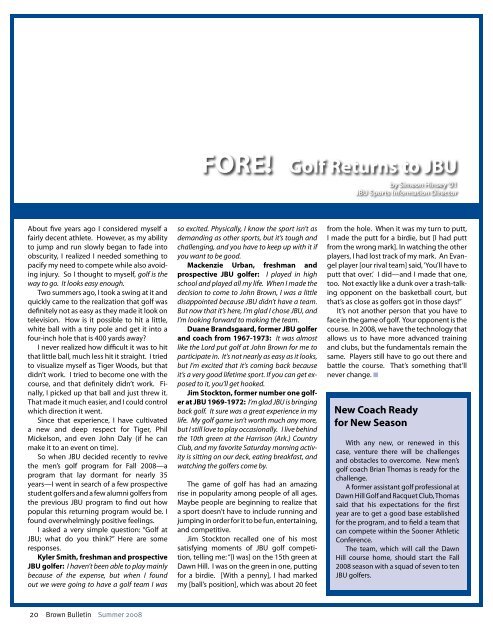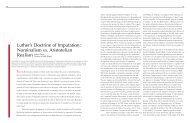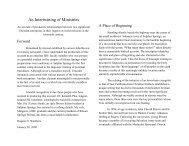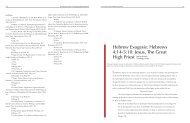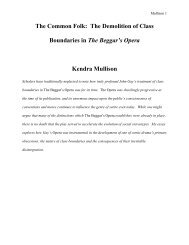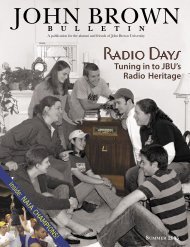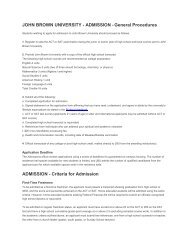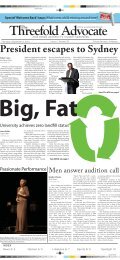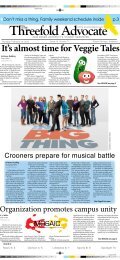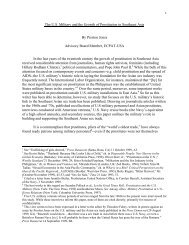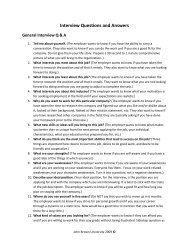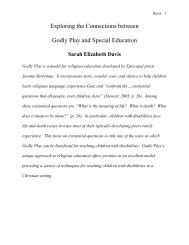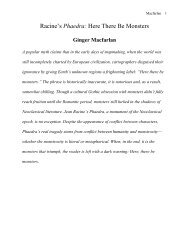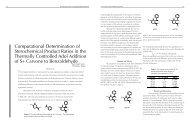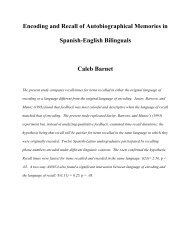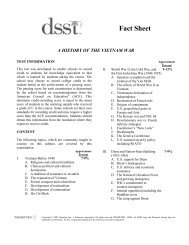Alumni Serious about Offering Freedom from Sexual Addiction
Alumni Serious about Offering Freedom from Sexual Addiction
Alumni Serious about Offering Freedom from Sexual Addiction
You also want an ePaper? Increase the reach of your titles
YUMPU automatically turns print PDFs into web optimized ePapers that Google loves.
Justice for All<br />
Alum Defends the Least of These<br />
by Linda Wyman ’07<br />
World View<br />
“Speak up for those who cannot speak for themselves, for the rights of all who are destitute.<br />
Speak up and judge fairly; defend the rights of the poor and needy.” Proverbs 31:8-9<br />
About five years ago I considered myself a<br />
fairly decent athlete. However, as my ability<br />
to jump and run slowly began to fade into<br />
obscurity, I realized I needed something to<br />
pacify my need to compete while also avoiding<br />
injury. So I thought to myself, golf is the<br />
way to go. It looks easy enough.<br />
Two summers ago, I took a swing at it and<br />
quickly came to the realization that golf was<br />
definitely not as easy as they made it look on<br />
television. How is it possible to hit a little,<br />
white ball with a tiny pole and get it into a<br />
four-inch hole that is 400 yards away<br />
I never realized how difficult it was to hit<br />
that little ball, much less hit it straight. I tried<br />
to visualize myself as Tiger Woods, but that<br />
didn’t work. I tried to become one with the<br />
course, and that definitely didn’t work. Finally,<br />
I picked up that ball and just threw it.<br />
That made it much easier, and I could control<br />
which direction it went.<br />
Since that experience, I have cultivated<br />
a new and deep respect for Tiger, Phil<br />
Mickelson, and even John Daly (if he can<br />
make it to an event on time).<br />
So when JBU decided recently to revive<br />
the men’s golf program for Fall 2008—a<br />
program that lay dormant for nearly 35<br />
years—I went in search of a few prospective<br />
student golfers and a few alumni golfers <strong>from</strong><br />
the previous JBU program to find out how<br />
popular this returning program would be. I<br />
found overwhelmingly positive feelings.<br />
I asked a very simple question: “Golf at<br />
JBU; what do you think” Here are some<br />
responses.<br />
Kyler Smith, freshman and prospective<br />
JBU golfer: I haven’t been able to play mainly<br />
because of the expense, but when I found<br />
out we were going to have a golf team I was<br />
FORE! Golf Returns to JBU<br />
so excited. Physically, I know the sport isn’t as<br />
demanding as other sports, but it’s tough and<br />
challenging, and you have to keep up with it if<br />
you want to be good.<br />
Mackenzie Urban, freshman and<br />
prospective JBU golfer: I played in high<br />
school and played all my life. When I made the<br />
decision to come to John Brown, I was a little<br />
disappointed because JBU didn’t have a team.<br />
But now that it’s here, I’m glad I chose JBU, and<br />
I’m looking forward to making the team.<br />
Duane Brandsgaard, former JBU golfer<br />
and coach <strong>from</strong> 1967-1973: It was almost<br />
like the Lord put golf at John Brown for me to<br />
participate in. It’s not nearly as easy as it looks,<br />
but I’m excited that it’s coming back because<br />
it’s a very good lifetime sport. If you can get exposed<br />
to it, you’ll get hooked.<br />
Jim Stockton, former number one golfer<br />
at JBU 1969-1972: I’m glad JBU is bringing<br />
back golf. It sure was a great experience in my<br />
life. My golf game isn’t worth much any more,<br />
but I still love to play occasionally. I live behind<br />
the 10th green at the Harrison (Ark.) Country<br />
Club, and my favorite Saturday morning activity<br />
is sitting on our deck, eating breakfast, and<br />
watching the golfers come by.<br />
The game of golf has had an amazing<br />
rise in popularity among people of all ages.<br />
Maybe people are beginning to realize that<br />
a sport doesn’t have to include running and<br />
jumping in order for it to be fun, entertaining,<br />
and competitive.<br />
Jim Stockton recalled one of his most<br />
satisfying moments of JBU golf competition,<br />
telling me: “[I was] on the 15th green at<br />
Dawn Hill. I was on the green in one, putting<br />
for a birdie. [With a penny], I had marked<br />
my [ball’s position], which was <strong>about</strong> 20 feet<br />
by Simeon Hinsey ‘01<br />
JBU Sports Information Director<br />
<strong>from</strong> the hole. When it was my turn to putt,<br />
I made the putt for a birdie, but [I had putt<br />
<strong>from</strong> the wrong mark]. In watching the other<br />
players, I had lost track of my mark. An Evangel<br />
player [our rival team] said, ‘You’ll have to<br />
putt that over.’ I did—and I made that one,<br />
too. Not exactly like a dunk over a trash-talking<br />
opponent on the basketball court, but<br />
that’s as close as golfers got in those days!”<br />
It’s not another person that you have to<br />
face in the game of golf. Your opponent is the<br />
course. In 2008, we have the technology that<br />
allows us to have more advanced training<br />
and clubs, but the fundamentals remain the<br />
same. Players still have to go out there and<br />
battle the course. That’s something that’ll<br />
never change. ■<br />
New Coach Ready<br />
for New Season<br />
With any new, or renewed in this<br />
case, venture there will be challenges<br />
and obstacles to overcome. New men’s<br />
golf coach Brian Thomas is ready for the<br />
challenge.<br />
A former assistant golf professional at<br />
Dawn Hill Golf and Racquet Club, Thomas<br />
said that his expectations for the first<br />
year are to get a good base established<br />
for the program, and to field a team that<br />
can compete within the Sooner Athletic<br />
Conference.<br />
The team, which will call the Dawn<br />
Hill course home, should start the Fall<br />
2008 season with a squad of seven to ten<br />
JBU golfers.<br />
Before moving to Guatemala, before<br />
earning a law degree, before her first<br />
day of classes at John Brown University,<br />
Andrea Comfort ’04 was a little girl living<br />
in Kansas City who cared a great deal for<br />
the people around her.<br />
“I remember hating seeing the dorky<br />
kids get picked on at school by the cool<br />
kids, or the little kids getting picked on by<br />
the big kids,” she said.<br />
After graduating <strong>from</strong> JBU, Comfort<br />
moved to Virginia Beach and then to<br />
Washington, D.C., to graduate <strong>from</strong><br />
American University Washington College<br />
of Law in 2007. Then in 2007 she moved<br />
to Guatemala to work with International<br />
Justice Mission(IJM), a human rights<br />
agency that secures justice for victims<br />
of slavery, sexual exploitation, and other<br />
forms of violent oppression.<br />
According to its web site, “IJM lawyers,<br />
investigators, and aftercare professionals<br />
work with local governments to ensure<br />
victim rescue, to prosecute perpetrators,<br />
and to strengthen the community and<br />
civic factors that promote functioning<br />
public justice systems.”<br />
IJM currently has operations in<br />
Cambodia, the Philippines, Thailand,<br />
India, Kenya, Rwanda, Uganda, Zambia,<br />
Bolivia, Guatemala, Honduras, and<br />
Peru.<br />
“In the practice of law, you can choose<br />
to be a defender of the big kid or the little<br />
kid,” Comfort explained. “Both have<br />
value in the legal system, but my Christian<br />
faith draws me toward protecting the little<br />
kid. I believe God calls us to fight for<br />
those who cannot fight for themselves as<br />
an expression of His love and justice on<br />
this earth.”<br />
In Guatemala, Comfort has worked<br />
as a co-counsel to the Guatemalan public<br />
prosecutor on cases of child sexual abuse.<br />
Her diplomatic responsibilities lead<br />
her to meetings with the Guatemalan<br />
Ambassador to the United States, the<br />
Guatemalan Vice-Minister of Foreign<br />
Affairs, and the First Vice-President of<br />
the Guatemalan Congress, promoting<br />
legislation and discussion regarding the<br />
protection of child victims of sexual<br />
abuse and trafficking.<br />
As part of her work with victim<br />
relief assistance, she visits client homes,<br />
determining levels of safety in homes,<br />
providing baby clothes to pregnant<br />
clients, removing children who remain<br />
in dangerous home situations, obtaining<br />
judicial orders to remove parent custody<br />
when necessary, and assisting victims’<br />
parents in finding adequate employment<br />
to support their children. She spends<br />
her days building relationships with the<br />
people around her, evaluating what their<br />
needs are, and determining how she can<br />
best serve them.<br />
Comfort first heard <strong>about</strong> IJM during<br />
a chapel service in her junior year at<br />
JBU, and she says, “My life was forever<br />
changed.”<br />
“It was during my studies at JBU that<br />
I first came to understand that a human<br />
rights violation is a violation against the<br />
God who created that person,” she said.<br />
“My motivation to fight human rights<br />
abuses is first and foremost to defend the<br />
inherent dignity that God himself has<br />
placed in every human being.”<br />
Living in Guatemala, Comfort has<br />
seen firsthand human rights abuses and<br />
the people who endure them. As a result,<br />
she has developed a more compassionate<br />
view of those in need.<br />
“I don’t see the poor [as being] nearly<br />
as pathetic as I use to,” she said. “On<br />
mission trips, I’d go and feel sorry for<br />
the poor, for their small houses and lack<br />
of running water. What I have realized<br />
through the people in Guatemala and<br />
my work here is that it is not poverty that<br />
bothers me anymore…it is injustice and<br />
lack of educational opportunities.”<br />
Comfort’s decision to move to<br />
Guatemala and work with IJM came with<br />
a cost, which was, the prolonging of her<br />
student loans, which altogether give her<br />
six-figure debt. But for Comfort, who<br />
Comfort poses for a photo with a child she met on a<br />
trip to Honduras. Because much of her work is of a<br />
sensitive nature, Comfort does not publish photos<br />
of her Guatemalan clients.<br />
raises missionary support to work for<br />
IJM, the injustices suffered by the helpless<br />
were more a pressing need than her own<br />
financial security.<br />
“The law school system in America<br />
is created by big law firms, for big law<br />
firms,” she said. “I would like to do<br />
something to change this, to make it easier<br />
for people who truly desire to spend their<br />
legal careers serving the poor to do that<br />
without the restriction of loans.”<br />
Comfort’s commitment with IJM ends<br />
this summer. She will move to Washington,<br />
D.C. to work as a federal judicial clerk with<br />
the Honorable Judge Eric Bruggink at the<br />
U.S. Court of Federal Claims. But even<br />
up to the end of her time in Guatemala,<br />
she has been fully committed to love and<br />
serve her neighbors.<br />
“God has given me a gift of arguing<br />
with perseverance and a desire to defend<br />
the defenseless, which I believe reflects<br />
His heart to protect and defend His<br />
children,” Comfort concluded. “Every<br />
believer has different gifts given to them<br />
by God, which they can offer to the work<br />
of the Kingdom.” •<br />
20 Brown Bulletin Summer 2008<br />
Brown Bulletin Summer 2008 21


